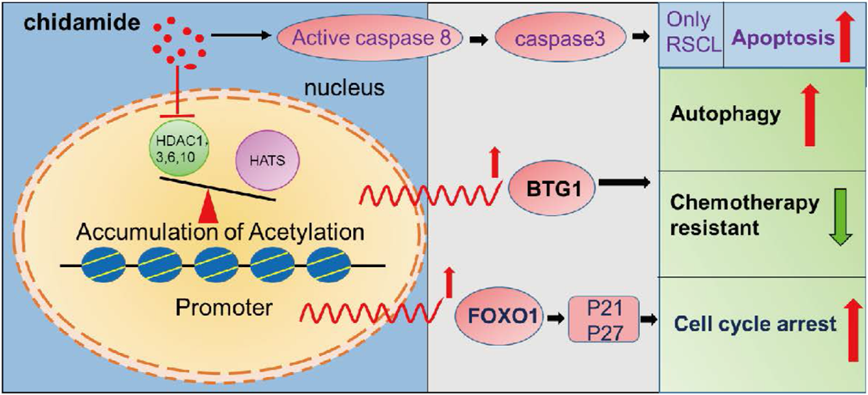Researchers Reveal Role of Chidamide in Diffuse Large B-Cell Lymphoma
A recent study published online in CELL DEATH & DISEASE revealed the role and mechanism of chidamide in diffuse large B-cell lymphoma (DLBCL). It was performed by Dr. WANG Lan's group from Shanghai Institute of Nutrition and Health (SINH) of the Chinese Academy of Sciences in collaboration with Dr. GUO Weijian from Fudan University Shanghai Cancer Center. Dr. WANG's group identified that the therapeutic efficacy of Chidamide, a novel histone deacetylase (HDAC) inhibitor, in a RRCL-derived cell/mouse model, which will contribute to the clinical application of HDAC inhibitors in relapsed/refractory B-cell lymphoma.
Lymphoma is a kind of malignant tumor originating from lymphohematopoietic tissue, which is divided into Hodgkin's lymphoma and non-Hodgkin's lymphoma. Diffuse large B-cell lymphoma (DLBCL) is the most common lymphoma subtype. The 6-8 cycle R-CHOP regimen has become the first-line standard of treatment for DLBCL. For both elderly and young patients, the 5-year survival rate can reach 70%, and most patients can survive without disease for a long time. However, there are still some patients who have poor response to initial treatment, or relapse in a short time, and the prognosis is very poor. Thus, there is an urgent need for new drugs to improve the outcomes of the salvage therapies.
Firstly, researchers detected the cell proliferation of rituximab/chemotherapy resistant B-cell lymphoma cell lines (RRCLs), and found that chidamide treatment induced growth inhibition and G0/G1 cell cycle arrest. Consistently, the same results were obtained in primary B-cell lymphoma cells from Rituximab/chemotherapy relapsed patients.
Subsequently, they detected the apoptosis of RRCL treated with chidamide. Interestingly, chidamide did not increase the apoptosis of RRCL, which may be due to the lack of pro-apoptotic protein. To identify the novel target genes and pathways regulated by chidamide to promote the death of RRCL, researchers performed RNA-seq analysis, and found that upregulation of FOXO1 and changes of cell cycle-related proteins induced by chidamide treatment. Further study found that chidamide promotes the death of RRCL by inducing the upregulation of BTG1.
Then, researchers performed the ChIP assay, and the results showed that the binding of acetyl histone H3K9 to BTG1 promoter was significantly increased after chidamide treatment. Moreover, the combination of chidamide with the chemotherapy drug cisplatin increased growth inhibition on the RRCL in a synergistic manner, and significantly reduced the tumor burden of a mouse lymphoma model established with engraftment of RRCL.
Taken together, these results provide a theoretic and mechanistic basis for further evaluation of the chidamide-based treatment in rituximab/chemotherapy relapsed and refractory B-cell lymphoma patients.
This work entitled “Chidamide triggers BTG1-mediated autophagy and reverses the chemotherapy resistance in the relapsed/refractory B-cell lymphoma” was published online on October 1st 2021, and was sponsored by National Natural Science Foundation of China, Ministry of Science and Technology, Program of Shanghai Academic/Technology Research Leader, etc.

Chidamide triggers BTG1-mediated autophagy and reverses the chemotherapy resistance in the relapsed/refractory B-cell lymphoma. (Image provided by Dr. WANG's group)
Media Contact:
WANG Jin (Ms.)
Shanghai Institute of Nutrition and Health,
Chinese Academy of Sciences
Email: sibssc@sibs.ac.cn
Web: http://english.sinh.cas.cn/
